April 29, 2012
Sheltering Sky – premiere and recording
I’ve just posted the recording of my new “grade 3” (moderately easy) concert band piece, “Sheltering Sky,” as recorded by Caroline Beatty and the Texas State University Wind Symphony. The recording is a stunner. When I wrote the piece, I only heard the MIDI, and a slow piece — one that should contain a lot of natural rubato — sounds pretty awful as MIDI. Caroline made it sound like real music — not “young band” music. I love her recording (you can hear it on the “Sheltering Sky” media page), and I can’t thank her and her students enough for the time and work they put into making this recording.
Aw, hell, let me just embed the recording here, so you can listen while you read the post…
[ca_audio url=”https://www.johnmackey.com/audio/ShelteringSky-TXST.mp3″ width=”500″ height=”27″ css_class=”codeart-google-mp3-player”]
The recording is so good, though, it makes it hard to believe that the piece is playable by much younger groups — as young as middle school, as the premiere showed…
The premiere was on April 21. The commissioning schools were Traughber Junior High School (Rachel Maxwell, director) and Thompson Junior High School (Daniel Harrison, director), both in Oswego, Illinois, just outside Chicago.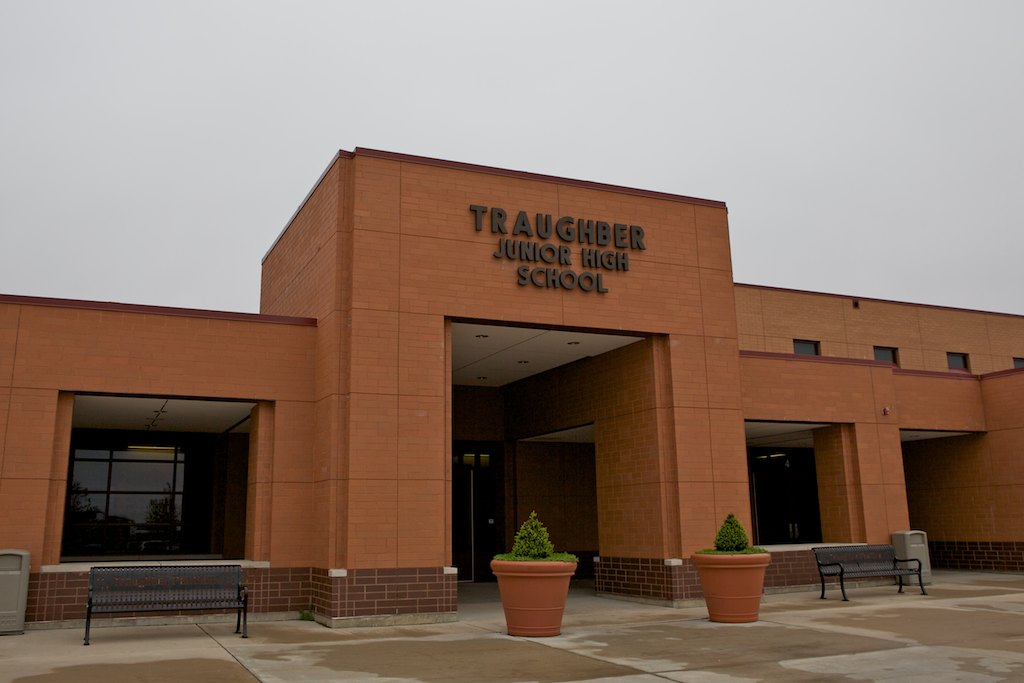
I spent my first day in town speaking with the bands at both schools. I don’t typically work with students this young, and what struck me was the wide range of questions, from things like “where do you get your musical inspiration?” (that one’s hard!) to “who is your favorite Disney princess” (duh, Ariel) to “if you could turn into any animal, what animal would you turn into?” (I think a cheetah.) The other cool thing about students this age is that they make me look enormously tall. Here I am with my much-younger doppelgänger.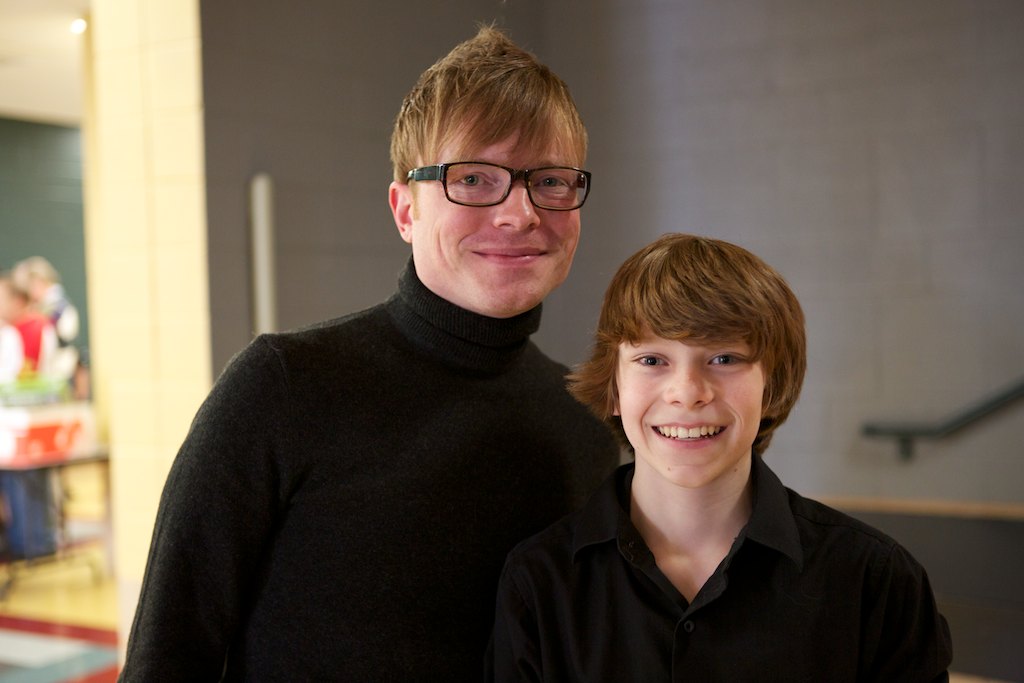
My hotel was the AmericInn, a perfectly fine place, provided you aren’t afraid of teddy bears, which were the primary decorating motif in the lobby. This teddy bear could lose a little weight, IMHO.
The bears were seriously everywhere.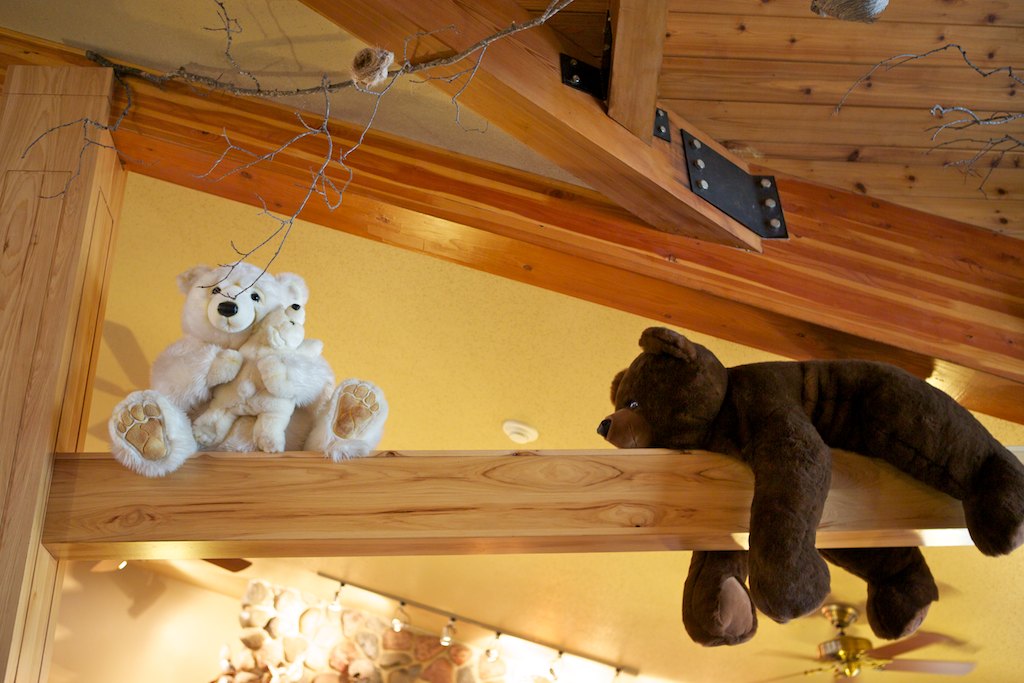
Stuffed animal = cute. Taxidermied animal = less cute.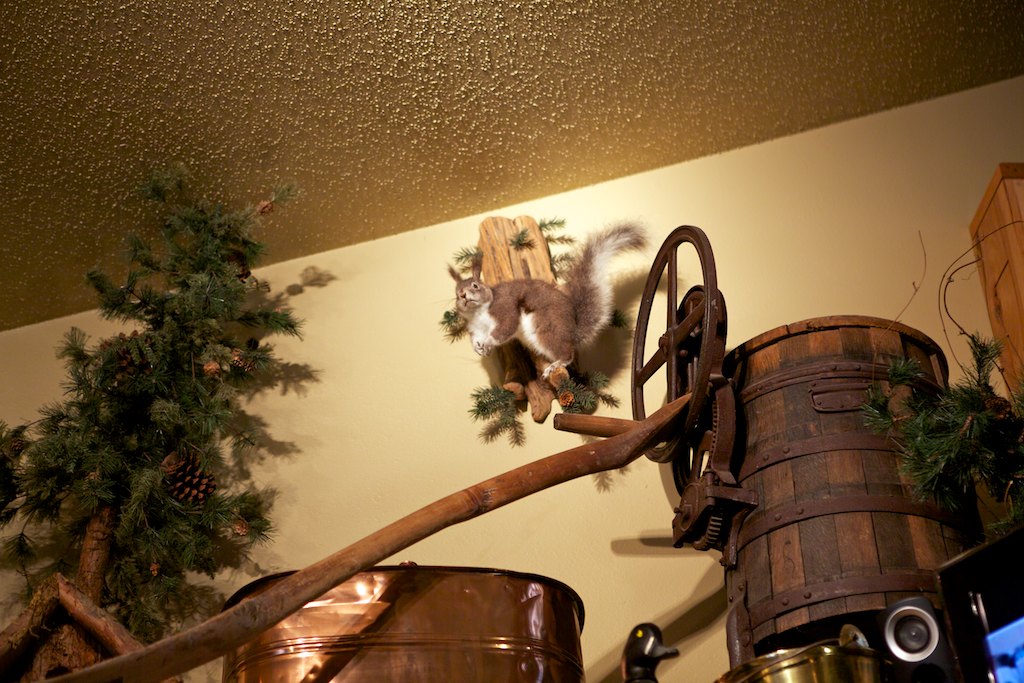
You know you’re in the burbs when the biggest safety concern is not guns, but gum. I prefer this, but was a little bummed I couldn’t chew in the building.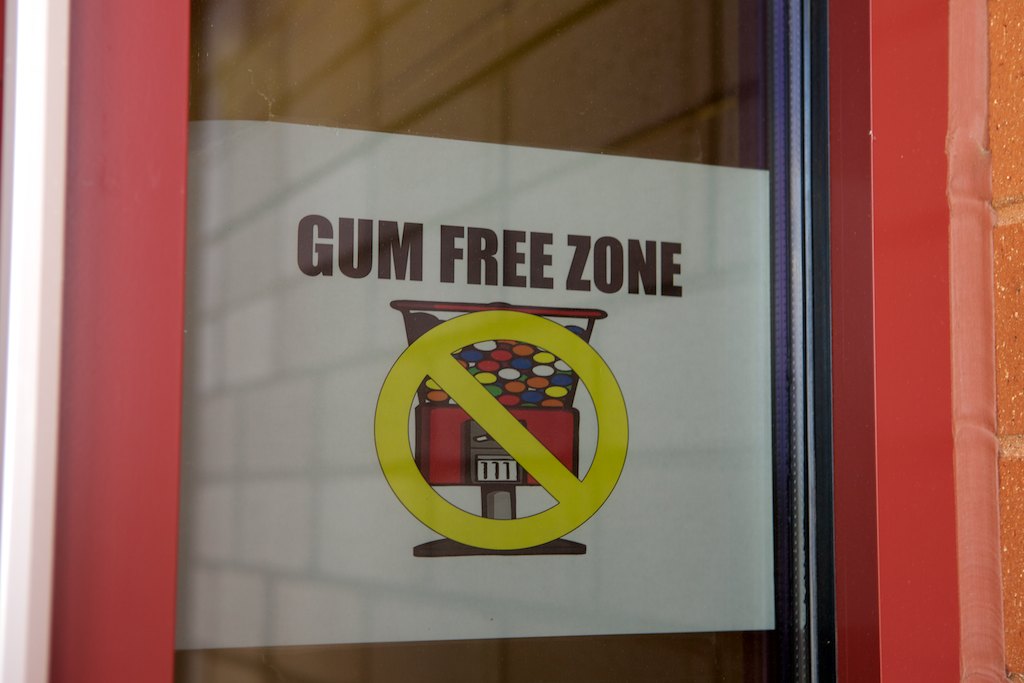
The premiere itself was with an honor band consisting of students from that school district. They all got together on Friday afternoon for a few hours of rehearsal, then again Saturday morning, and gave the concert on Saturday afternoon. 90+ middle school students in an honor band worked out a lot better than one might expect. (Nobody burned down the building.) This looks like a trail of band instrument tears, but don’t worry; the students were just on break.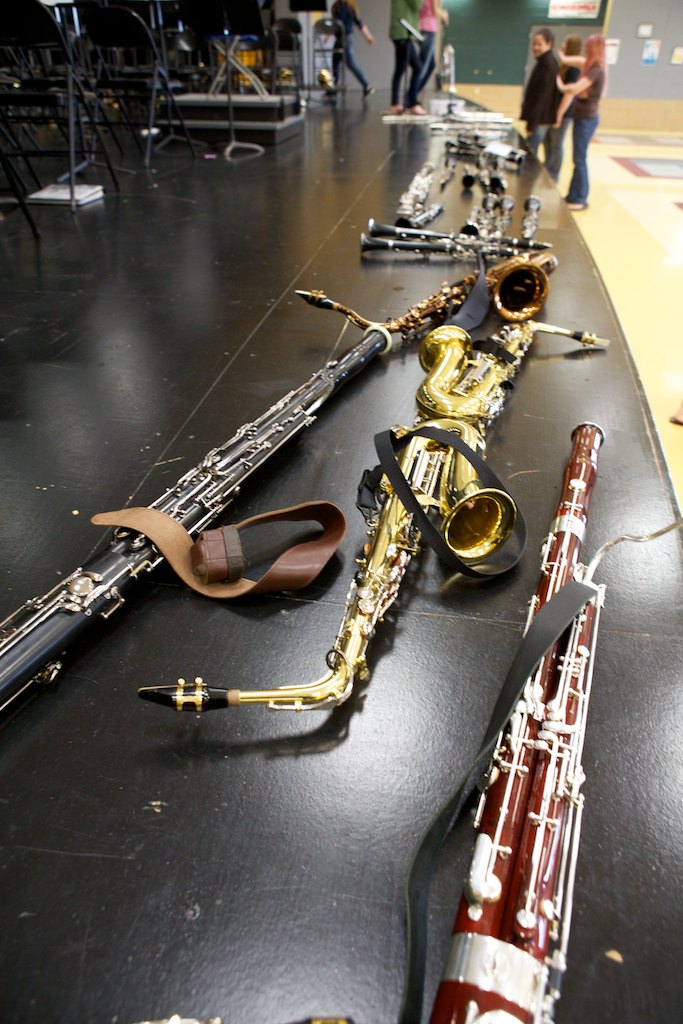
Every student had a name tag on their music stand. I love it that Ashrita labeled hers with a figure in 5/16. You’ve won my heart, Ashrita.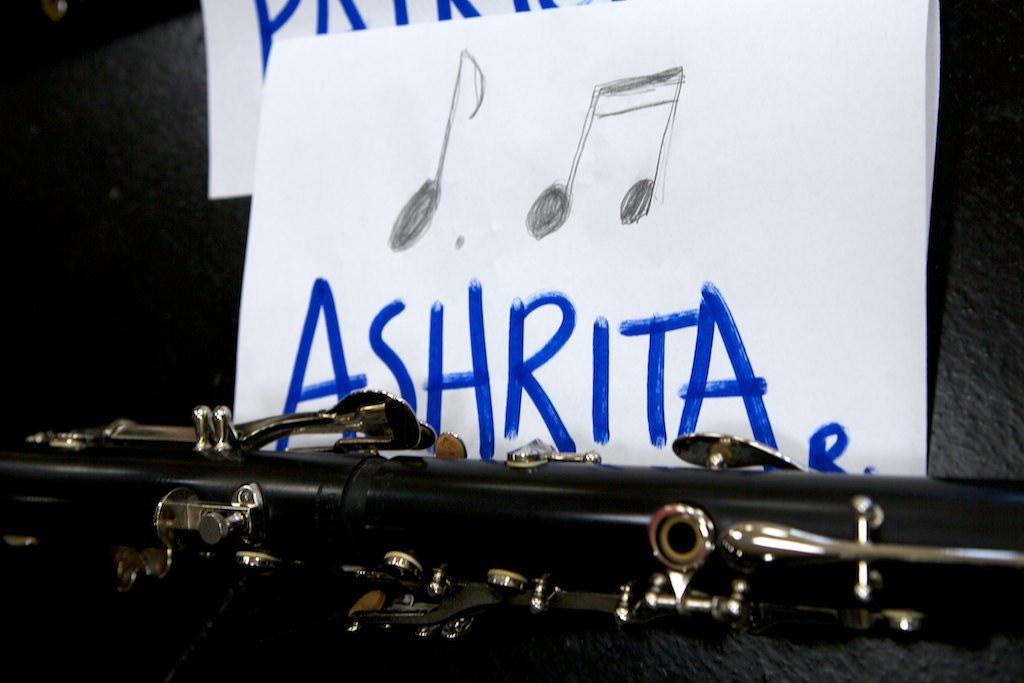
Pre-concert lunch! (That’s not my bag, although now I want one.)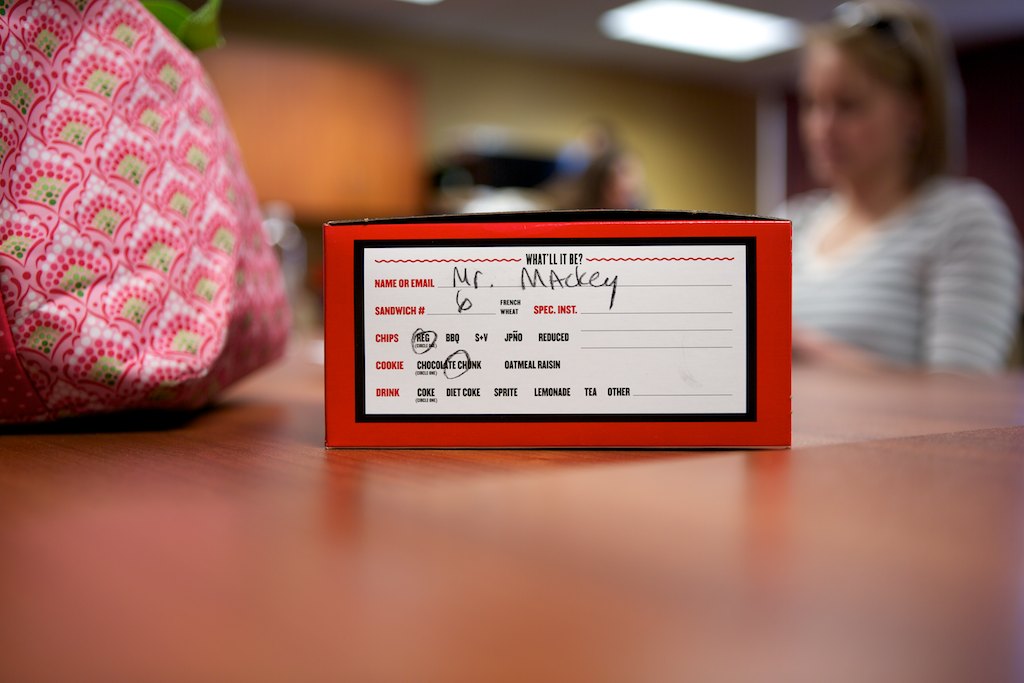
Setting up for the webcast! Or wait… maybe that’s Facebook.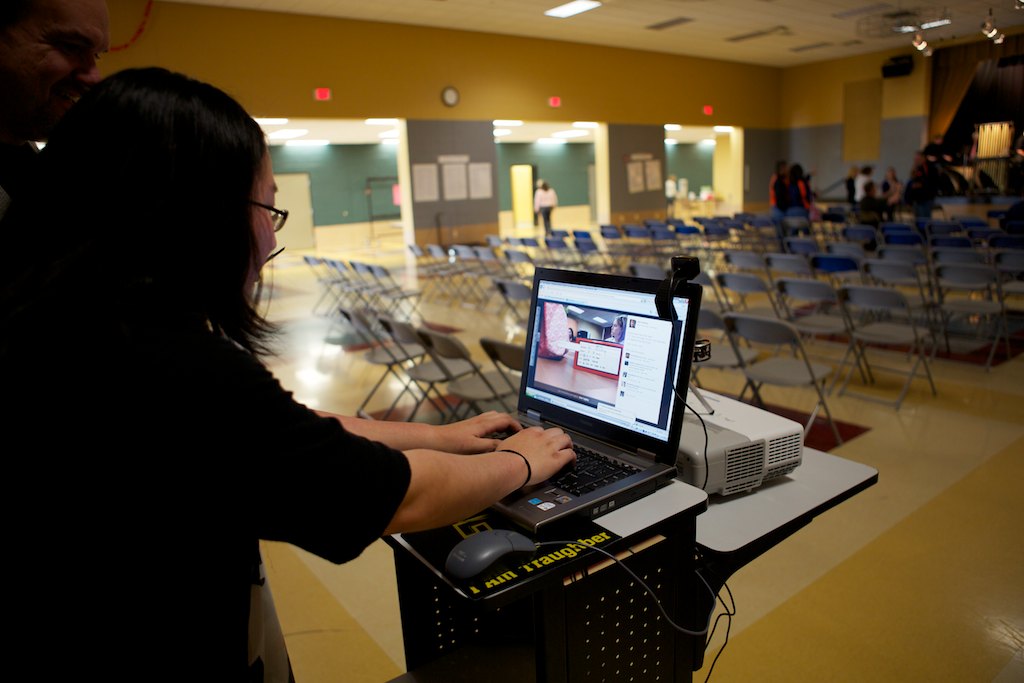
There really was plenty of video documentation. I sort of felt like I was supposed to get on stage and apologize for a scandal, like the time I was impeached from the presidency of my high school drama club. (That really did happen.)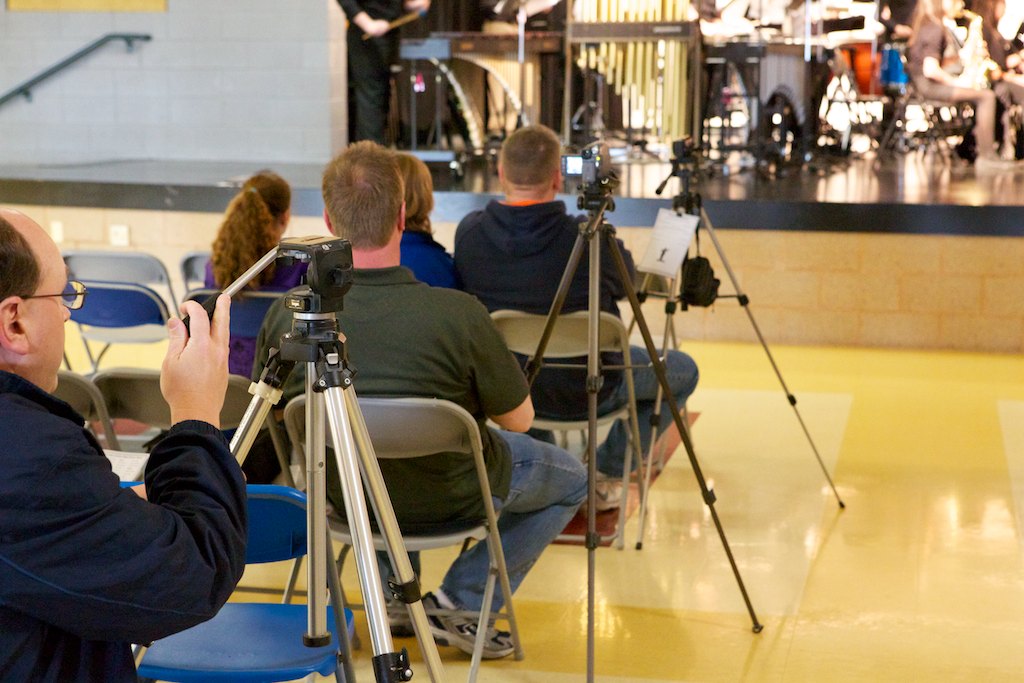
Don’t mess up, kid. You’re being watched. DON’T MESS UP.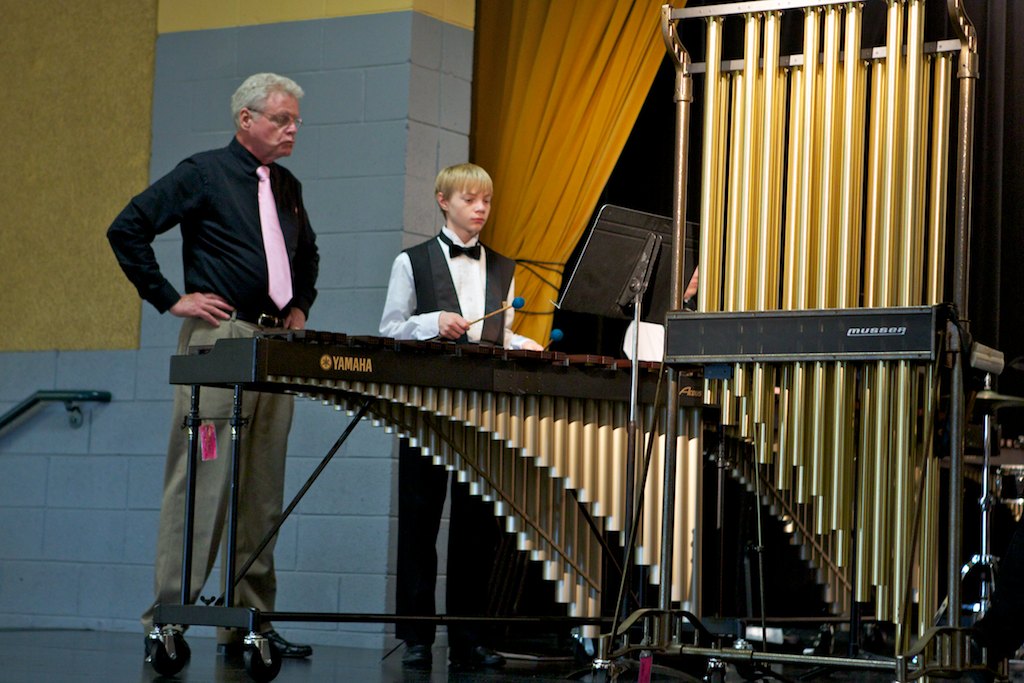
Hey, why so glum?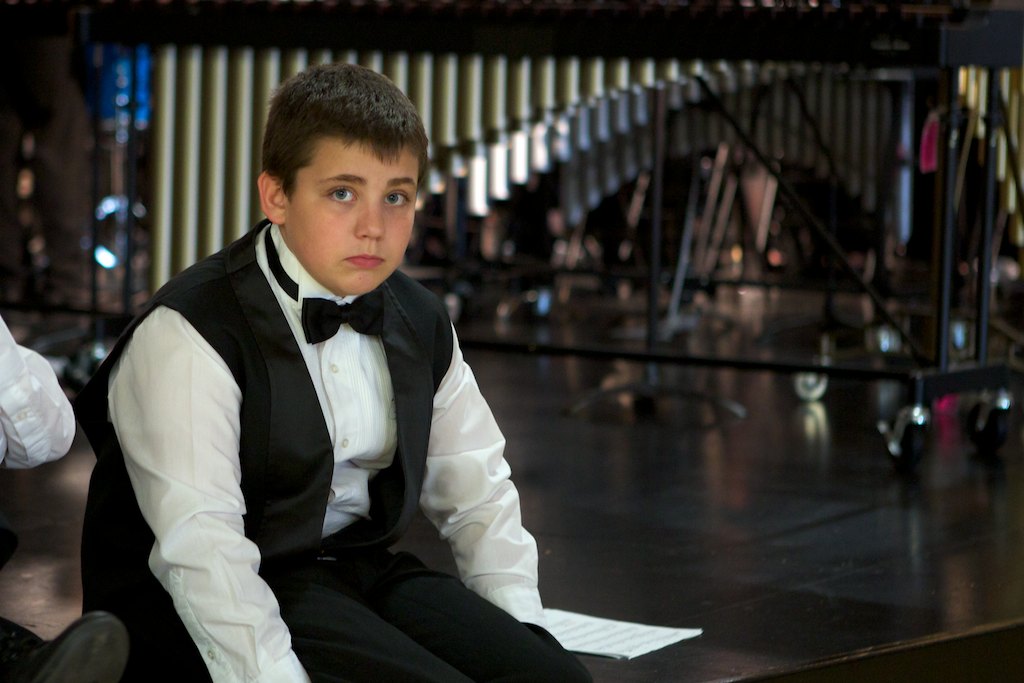
It’s CONCERT TIME!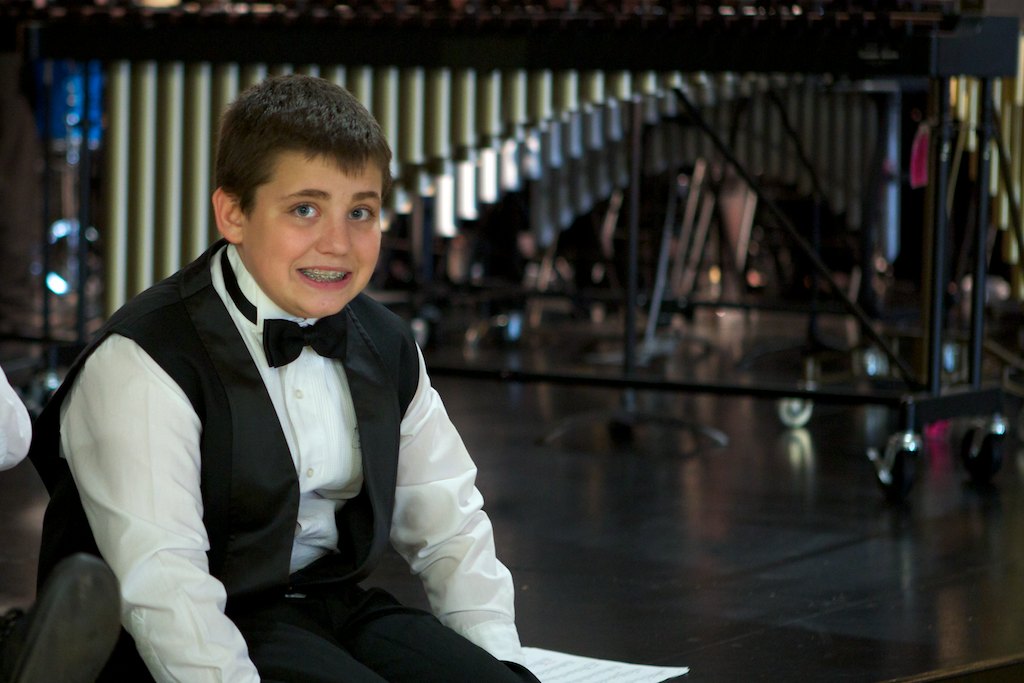
Here’s Rachel Maxwell, conducting the premiere.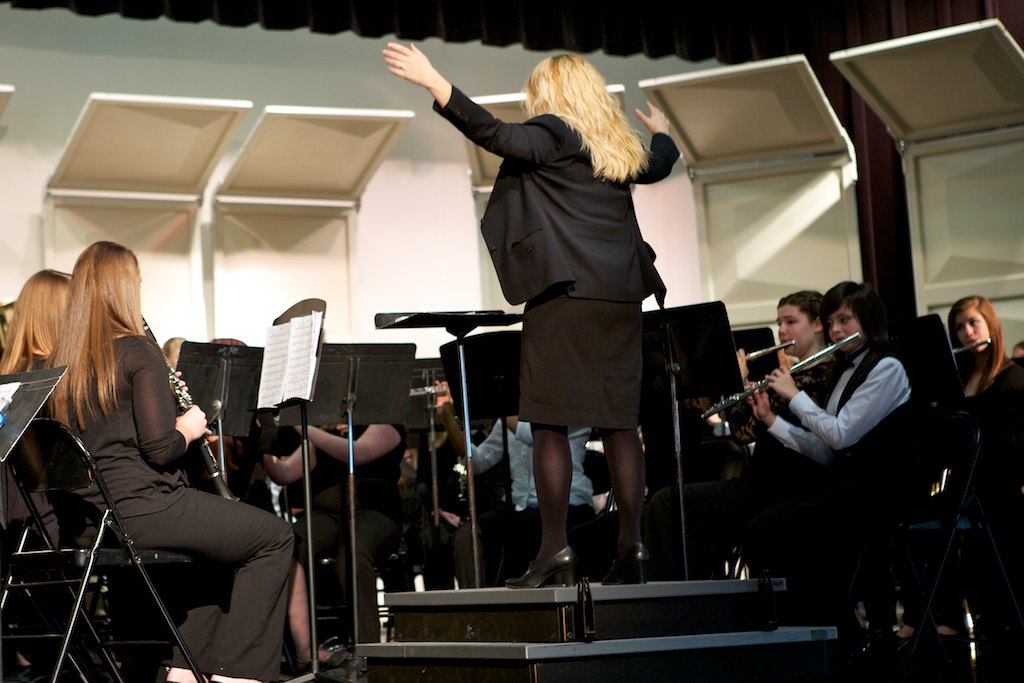
“Sheltering Sky” has a lot of bowed vibraphone. This was this player’s first time bowing a vibraphone. Nailed it.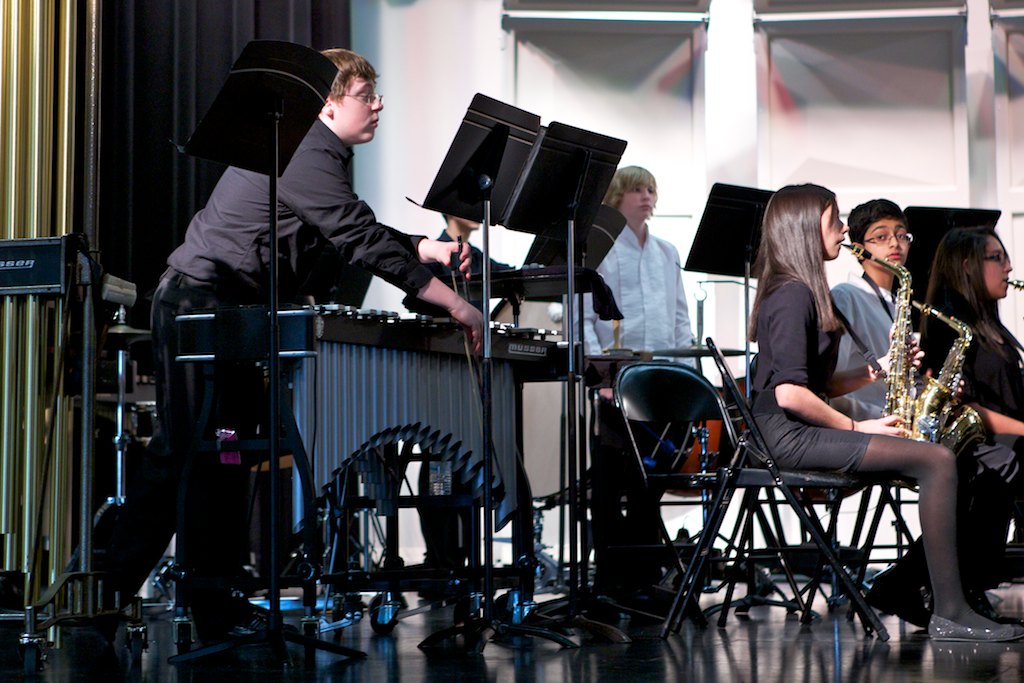
The premiere went really well. It turns out (even if the Texas State recording makes it hard to believe) that this really is a “grade 3” piece! Thank you to Rachel, Dan, and the staff, students, and parents. “Sheltering Sky” wouldn’t exist without you and all of your work and generosity. Now go check out Texas State’s recording!
April 18, 2012
The water in Plano
A few weeks ago, I wrote about a great couple of days I’d had leading clinics in the Dallas area — in Plano, Allen, and Rockwall. One group I didn’t get to work with, due to time limitations, was the Rice Middle School Band in Plano. Richard Floyd, for whom I wrote “Strange Humors” a few years back, worked with the group and emailed me after his clinic to rave about them. Richard works with a lot of bands, and works with a lot of bands on my music, but it’s unusual to get an email like the one he sent me. He also asked the director, Jason Tucker, to send me a recording of their performance at the Meyerson Symphony Center so I could hear it.
Well, they sent it, and this is what it sounds like. This is a middle school band. It’s not one of those junior high bands you hear about in Japan. No, this band is right here in the US. AND THESE ARE MIDDLE SCHOOL KIDS. This has to be one of the best performances I have ever heard of the piece anywhere, by any group. The opening solo is on bassoon because they didn’t have an English horn, but I love it there — at least when the bassoonist plays like this.
[ca_audio url=”https://www.johnmackey.com/audio/rice.mp3″ width=”500″ height=”27″ css_class=”codeart-google-mp3-player”]
Unbefrigginlievable.
View Comments
Comments
Rice is a magical place. Glad you got to hear thoe amazing kids!
This was a really fun to peice to work on. I really enjoyed playing it. I was thrumpet player at G and Measure 147.
Wow, I sure loved playing this! I play the tuba in this band, and I certainly enjoyed performing this at the Meyerson. What an incredible opportunity for young musicians like ourselves.
This is one of those pieces that challenges you to play better, and have fun with it at the same time. Of course, i couldn't have gone through this amazing experience if John Mackey hadn't written this piece, so thank you!
Bass Clarinets FOR THE WIN!!!
This was my favorite piece to play out of the program. Glad you liked it! :) Epic Flutes
Yeah Rice kiddos!! Good job!
Miss you guys!
When I first heard this piece, I thought," Well, this might be a long shot for us..." Turns out, we made it!
Thanks to Mr. Mackey for writing this amazing piece and recognizing us for it.
I was the bassoon soloist for this piece. It was really a lot of fun to learn and play. We all had a great time and ended up having an incredible performance. Mr. Mackey, you have written a very fantastic piece. I'm glad you like it!
I was the marimba player. Amazing piece. I doubt that I'd ever find instructions to play like a schizophrenic Morse Code operator anywhere else.
Wow! You'd be fortunate to find a high school band this good! I can't believe this is a middle school band. Great performance!
I am proud to be the djembe player of this piece! It was definitely worth learning and exciting to play. Thank you Mr. Mackey for such a fun piece!
Wow this is terrible. Just kidding it's fantastic <3
Plano kids REPRESENT!
This sucks.
^
Add comment
April 17, 2012
Harvest at Cabrillo
I am over-the-top excited to finally share the news that this summer, Joseph Alessi (Principal Trombone, New York Philharmonic) will perform my concerto, “Harvest,” at the Cabrillo Festival of Contemporary Music, conducted by Marin Alsop.
Q: Wait, what? How? Cabrillo is a big-time orchestra festival. Isn’t “Harvest” a… a band piece?
A: No. Well, yes and no. It was commissioned by a consortium of military and university bands, and premiered by the West Point Band, but it’s not scored for traditional wind ensemble. It’s scored for “orchestra without strings.”
Q: What the hell does that even mean? What’s the difference between “wind ensemble” and “concert band” and “orchestra without strings?”
A: “Wind ensemble” is the fancy-pants name for “band,” and it traditionally means one player per part, with maybe a couple of exceptions like an extra clarinet or two. “Concert band” implies (to me, at least) that doubling can happen relatively freely, so you might have three people playing 1st trumpet, a total of 6 or more trombones (sharing 3 or 4 parts), a clarinet section with a dozen players (but only 3 different parts), etc. A wind ensemble or band or concert band or symphonic band or wind orchestra — or whatever we call it — normally includes a sax section, a euphonium (or several), and a whole bunch of percussionists. An orchestra doesn’t traditionally contain saxes or euphoniums, and usually only has 3-4 percussionists. Orchestras don’t double up on individual parts (other than strings), so if there are three clarinet parts, there will only be three clarinet players. An “orchestra without strings,” then, is a “wind ensemble” with no doubling instruments, no saxes, no euphonium, and only 3-4 percussionists.
Q: But this was commissioned by a bunch of bands. Why’d you write it for “orchestra without strings?” What about the saxes? Do you hate saxes?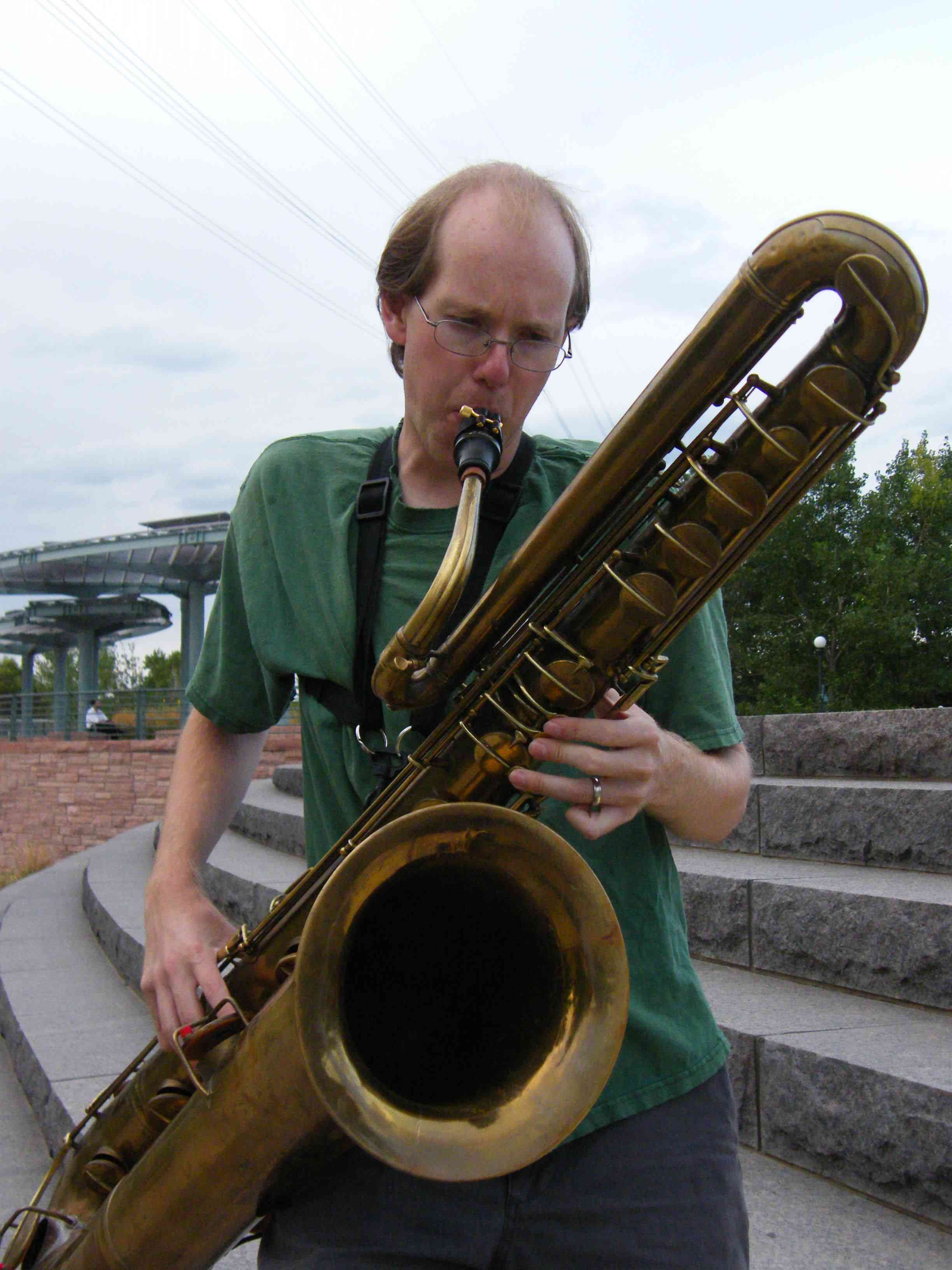
A: No. Clearly no. I love saxes. I have a big ol’ soprano sax concerto, and my wind ensemble works feature a lot of saxophone. I’m currently writing a piece for saxophone quartet! But the thinking with “Harvest” was that a smaller “orchestra without strings” ensemble would help avoid balance issues that might arise in a concerto accompanied by a standard wind ensemble; the scoring could be more transparent, but still be capable of being very loud; and without saxes to depend on, I’d probably write more interesting parts for the double reeds. Plus, because “Harvest” was commissioned for Joe Alessi, the Principal Trombonist of the New York Philharmonic — a player who solos and records with other orchestras all over the world — I wanted him to be able to play my piece with bands or with orchestras. Honestly, the remote possibility of a professional orchestra performance was very appealing.
Q: That sounds like a long shot, though. I mean, why would an orchestra program one of your pieces anyway? Last I heard, you aren’t dead. You know what orchestras say: The best composer is a dead composer.
A: Yes, it was a long shot. I mean, is the New York Philharmonic likely to program “Harvest” – or any of my music? No, but there was no reason, with this piece, to eliminate the possibility. I was hoping that I might have a distant shot at Cabrillo, though.
Q: Yeah, about that. How’d you convince them to program your piece? That’s a badass festival, and they program music by Big Time Composers like John Adams, Jennifer Higdon, John Corigliano, and James MacMillan. Why your piece?
A: That was all Marin Alsop, the Music Director of the festival. I met Marin several years ago when she performed “Redline Tango” (the original version for orchestra) at Cabrillo. It was an amazing couple of days. I really wanted to go back and work with her again, but, in all honesty, I didn’t have any other orchestra pieces that were good enough for her to program. Other than “Redline Tango,” my orchestra music is pretty old, and it’s not great, and I’m not just being modest.
Q: You’re never modest.
A: That wasn’t a question.
Q: Sorry. Go on.
A: Anyway, when I was about to start writing “Harvest,” my brilliant wife, AEJ —
Q: What’s her real name?
A: I’d rather not say. She’s very private.
Q: Is she even a real person? Or is this like one of those, “Oh, you wouldn’t know her. She lives in Canada” things?
A: She’s real. And again: brilliant.
Q: How brilliant could she really be? I mean, she married you. Heh.
A: She got 1580 on her GRE.
Q: Good christ. Okay, she’s brilliant. So, she must think you’re a complete moron.
A: Could we get back to “Harvest” at Cabrillo?
Q: Yeah, you were saying…
A: I was about to write “Harvest,” and AEJ suggested that I should score it for orchestra-without-strings, so that Joe Alessi (or other trombonists) could play it with orchestras or bands. So I emailed Marin Alsop and told her that I was about to write a concerto for Joe Alessi. They’d worked together in the past, and they’d even recorded the Pulitzer Prize-winning trombone concerto of Christopher Rouse. I thought that maybe, if offered a new chance to collaborate with Joe, Marin would think that sounded fun, and the possibility of working with him would outweigh the fact that I was the shlub writing the piece.
Q: So you just emailed her and asked her to program a concerto you hadn’t even started?
A: Good lord no. I’m very scared of Marin Alsop.
Q: Is she scary?
A: No. I’m just a coward, and I have a fear of powerful orchestral conductors. And water sports. And some dogs. I’m kind of scared of dogs.
Q: So what did you say in the email?
A: I just told her that I was about to write this concerto for Joe Alessi, and I was going to score it for orchestra without strings. I asked her if I could send it to her when it was done. She was very kind, and replied saying that yes, she’d like to see it, and that she loved working with Joe Alessi in the past, and to tell him hello.
Q: That was it?
A: I also emailed her to ask her if I should score it for triple winds or quadruple winds — that is, 3 flutes or 4, 3 clarinets or 4, etc. A standard orchestra has 3 of each, but I didn’t know if I could get away with 4. She replied “stick with 3,” so I started writing the piece with triple winds. Well, mostly. It’s three flutes plus a piccolo, and 3 clarinets plus a bass clarinet. But in a pinch, you could do it with true triple winds.
Q: And what happened next?
A: I finished it, it premiered, and as soon as I had the full, mastered recording — this was in December 2010 — I contacted Marin once more and asked her if she’d look at it.
Q: And you were like, “you should do it at Cabrillo!”
A: Of course not. I just asked if she’d give the piece a look. She sent a very nice reply — really, I don’t know why I’m still scared of her, but I am — and asked me to send it along. I packed it up, mailed it out, and three days later, she sent an email saying she wanted to do it at Cabrillo.
Q: That’s awesome. Did you send it to any other orchestra conductors?
A: No. I’ve sent other pieces to other orchestra conductors in the past – I sent “Redline Tango” to over a dozen conductors – and it proved to be a waste of time and money. Your piece ends up in a towering stack of other unsolicited scores – I saw it for myself when I worked for a major orchestra for a year after college – and nobody will ever listen to your piece. I’ve said before that orchestras don’t have much interest in living composers. Marin Alsop and Cabrillo are a rare exception.
Q: So I should send all of my music to Marin Alsop?
A: No, not unless she asks you for it. She first learned of “Redline Tango” not because I sent it blindly, but because Fran Richard at ASCAP, plus my former teacher John Corigliano, both told her about it. I had two people she respected vouching for the piece. I can’t say enough about how important that was.
Q: So, back to “Harvest” at Cabrillo. They actually got Joe Alessi as the soloist? Did Joe know you were trying to book him to play your piece?
A: I’d told him that I wanted to send the piece — and his recording — to Marin, hoping she might program it with him, and he was definitely on board with that, since he’d had great collaborations with her in the past. I think he had to shift some things around in his schedule to make Cabrillo work when they actually asked him, but the festival booked him, and programmed the piece for the final day of the 50th anniversary of the festival.
Q: You mean the grand finale concerts at the Mission San Juan Bautista?
A: Yes!
Q: But don’t they repeat that concert? They play the same program twice on the same day, right?
A: Yes!
Q: Does that mean that Joe Alessi has to perform your trombone concerto twice in the same day?
A: Yes!
Q: Good thing that dude is the best trombonist ever to walk the earth.
A: Agreed. It’s going to be a good time.
Q: I’m so going to that.
A: See you there.
(Edit: Since originally posting this, the festival has added a performance of “Breakdown Tango” to their “Music in the Mountains” concert on Thursday, August 9.)
(That’s me, the last time I attended Cabrillo, posing for my still-unreleased and unrecorded Christian Rock album cover.)
View Comments
Comments
Lisa Heemstra says
Love it! It was such an honor having you out! The piece is gorgeous and the kids had such an amazing experience! Your pictures are awesome, especially my fabulous lunch bag, oh yeah! Take Care!!
Geoff Adams says
Piece is incredible. Excellent performance, too.
Great work, sir. Great work.
Daniel Routh says
It kinda looks like you're pinching that kid's butt in the second picture.
John Adams says
My son's high school Honors band played this at the Texas UIL Concert and Sight Reading contest. They took Sweepstakes, and we received recordings of their performances. I can not stop listening to it. Very emotional piece that speaks to my soul! The conductor was moved to tears by the end. So so Beautiful!!
Add comment